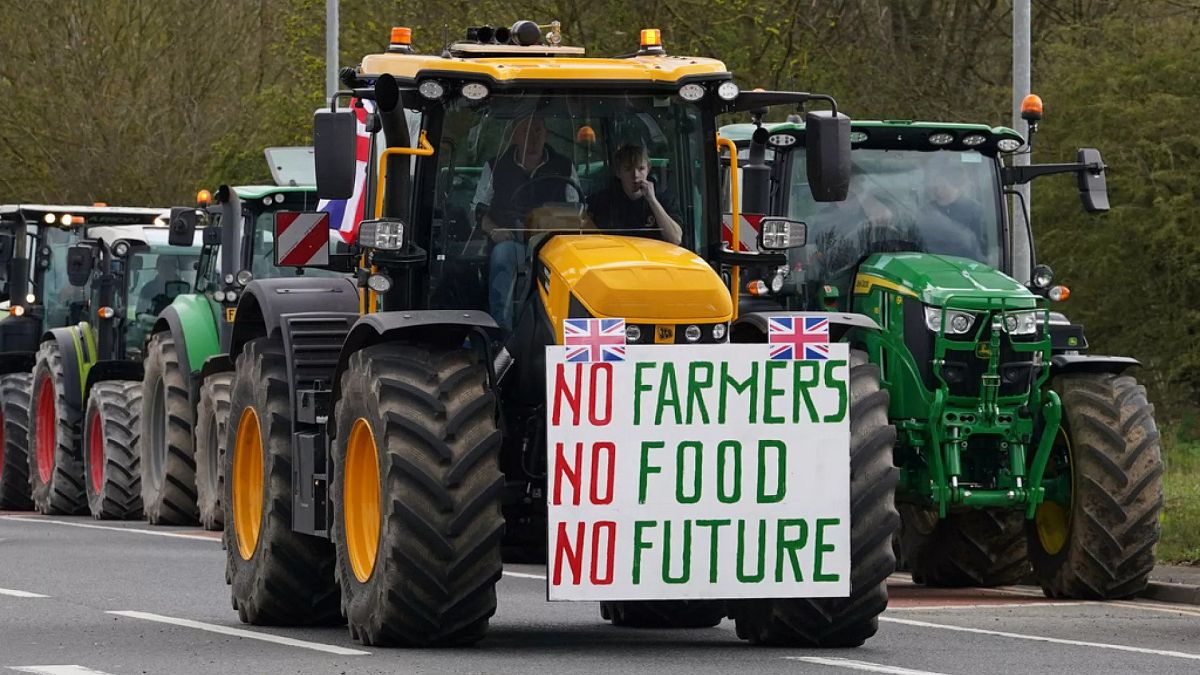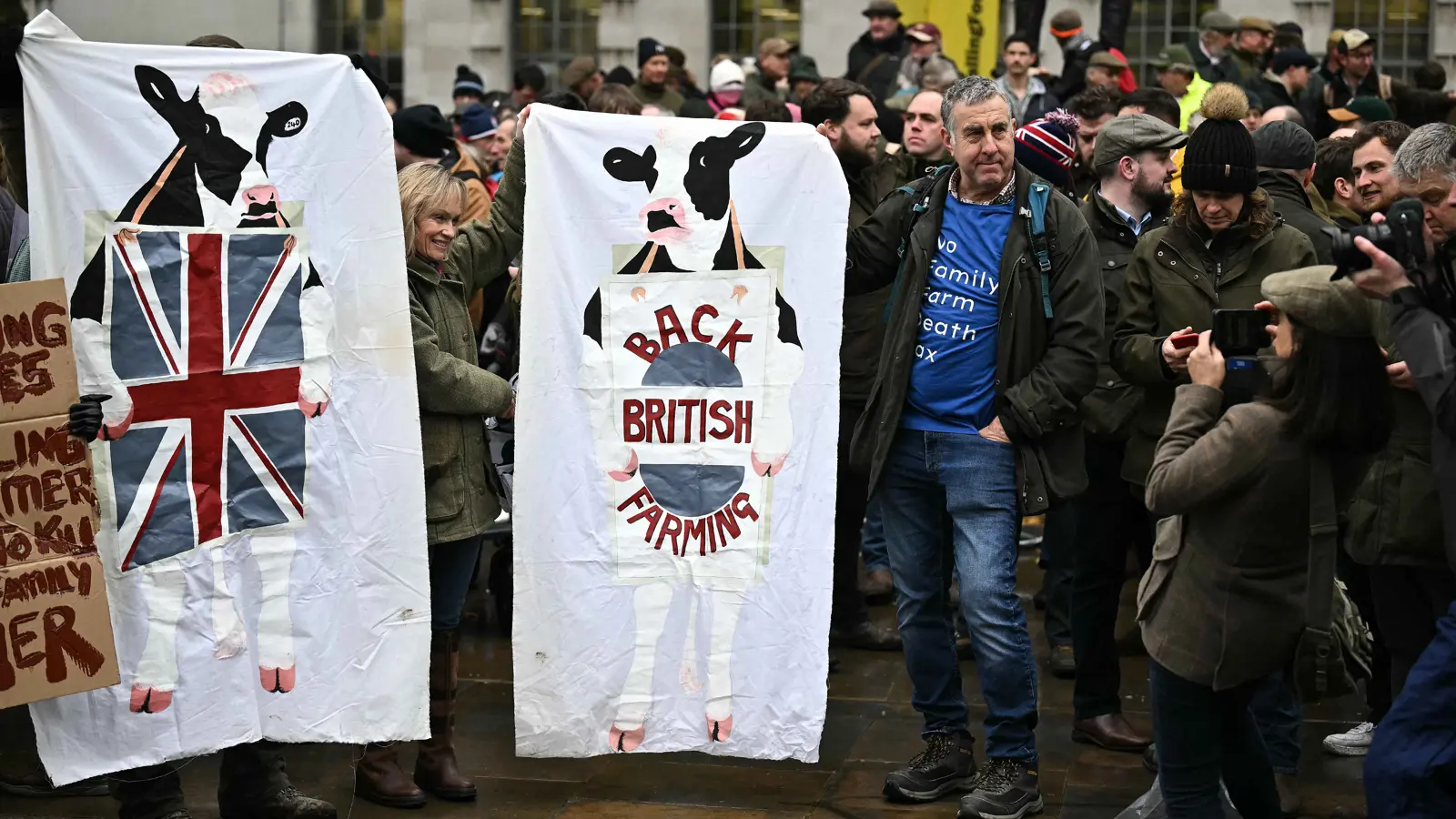How the Inheritance Tax Sparked a Crisis between the UK Government and Farmers

“According to the UK Treasury, around 500 farms per year will be affected by the new inheritance tax rules.”
British farmers have recently protested against their government’s policies which they deem as anti-farmer, including changes to the agricultural property relief (APR) taxation rules.
The measure, announced in the new government's budget last month as it sought to raise funds, has drawn an angry backlash from farmers who say the ruling Labour Party does not understand rural communities.
In turn, the Labour government announced its adherence to its position on inheritance tax despite the farmers' protest outside 10 Downing Street and Parliament.
It is worth noting that the severe weather exacerbated by climate change, global instability and the repercussions of Britain’s exit from the European Union are all factors that have exacerbated the burden on British farmers.
Inheritance Tax Protests
Britain has recently witnessed what can be called a ‘farmers’ revolt against inheritance tax changes’, which the Labour government announced in the general budget for the financial year 2024-2025.
Treasury Secretary Rachel Reeves announced in the budget last month that farms worth more than £1 million will have to pay a 20% inheritance tax from April 2026.
On November 19, thousands of farmers protested in London against the tax changes, raising slogans such as: ‘no farmers, no food, no future’ and ‘Starmer the farmer harmer’.
Jeremy Clarkson, the former Top Gear presenter who owns a farm, was among those demonstrating and said his message for the government was: “Please back down.”
The government has said the reforms would only target the most valuable farms while helping fund public services that farming communities rely on.
Environment Secretary Steve Reed says this change could raise £200 million a year for the NHS and other services.
According to British media, the number of farms that could be affected by the inheritance tax change is still disputed.
The government said the tax change would affect about 500 farms a year, with the tax rate payable in installments over 10 years.
But farmers say the numbers affected will be much higher. The Country Land and Business Association has estimated that 70,000 farms are worth more than 1 million pounds, and could be affected.
A recent poll by the Country Land and Business Association found over 86% of farmers said it was likely that some or all of their land would have to be sold upon their death if inheritance tax reliefs were scrapped.
Since 1992, the APR scheme has ensured that ancestral farmlands have been inherited by British farmers without paying a pound in tax.
This tax-free regime enjoyed by the British farmers was built on the rationale that farming wasn’t a typically profitable enterprise and requires tedious labour.

Unacceptable Changes
While Prime Minister Keir Starmer has repeatedly argued that the tax won’t affect a wide majority of farmers and would only collect revenue from the rich landowners, the protesting farmers aren’t convinced.
When asked if the changes to inheritance tax were class war on wealthier people, Starmer said his government is taking a balanced approach to fill a black hole in the public finances.
On her part, Conservative Party leader Kemi Badenoch described the new tax on farmers as draconian and would destroy the entire farming sector.
Badenoch promised: “We will do everything we can – if they don’t change their position now – to abolish this tax if we return to power.”
Shadow Home Secretary Chris Philp also said the tax changes would be a blow to the whole country.
Shadow Environment Secretary Victoria Atkins said farmers faced a threat from a city-dwelling socialist government which did not understand or care for the rural way of life.
Liberal Democrat leader Ed Davey attended the protests, telling farmers: “You deserve so much better.”
In contrast, Labour MPs representing rural constituencies have called on the Treasury to reconsider its tax changes targeting young families.
The British farm owners are the latest group of cultivators to launch protests against their government — a crisis that started off with the Dutch in 2019, boiled over to the Germans in 2023 who were then joined by their Polish and French farm brethren in their struggle against their respective governments’ early this year.
Meanwhile, the protests also reflect upon low food prices and increased expenses on agriculture such as fertilisers, pesticides and fuel.
In turn, Elon Musk, owner of X and the CEO of SpaceX and Tesla, compared the situation in Britain to Joseph Stalin's policies of taking over the lands of rich farmers.

Risky Decision
Recently, British farmers have threatened to target ports and disrupt supermarket supply chains in protest against the Labour government’s planned tax increases.
Some county farmers are also planning to withhold produce and livestock in an attempt to cause food shortages in the country.
In the same context, the Daily Express reported that ministers are currently drawing up contingency plans to ensure supermarket shelves remain full in the event of a farmers’ strike.
It is worth noting that British food security is largely dependent on fruit and vegetable imports, making any decision that affects farmers risky.
Despite calls for self-sufficiency since the Covid-19 pandemic, 2023 data showed the UK was only 53% self-sufficient in fresh vegetables, the lowest since 1988.
Britain posted a larger-than-expected government deficit in the first half of the 2024 financial year, putting pressure on Chancellor Rachel Reeves to cover the high spending in the upcoming budget and the gap.
As a result, the Labour government warned that it would have to take tougher options, especially with the Conservatives being accused several months ago of covering up a £22 billion budget deficit.

On his part, lawyer Bassam Tablieh explained in a statement to Al-Estiklal that “the Labour government recently reduced the exemptions granted for agricultural land, which means that more farmers will be subject to this tax when the farms are passed on to heirs.”
“Farmers fear that these changes will force them to sell off parts of their land to pay the tax, which could have a negative impact on the sustainability of their farming businesses,” he added.
Mr. Tablieh denounced the move, saying: “While the Starmer government is funding foreign farmers in Brazil, California, Africa and Asia with millions of pounds, thousands of farmers are protesting in London against changes to inheritance tax rules.”










